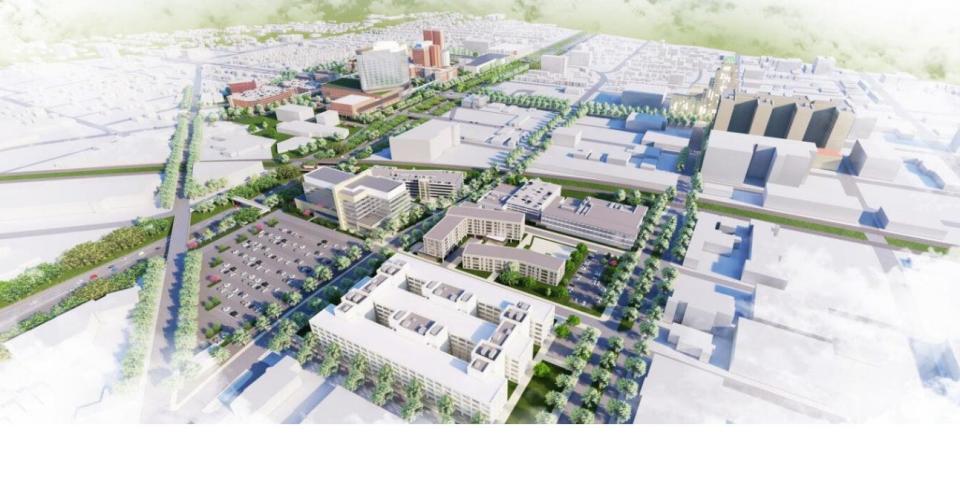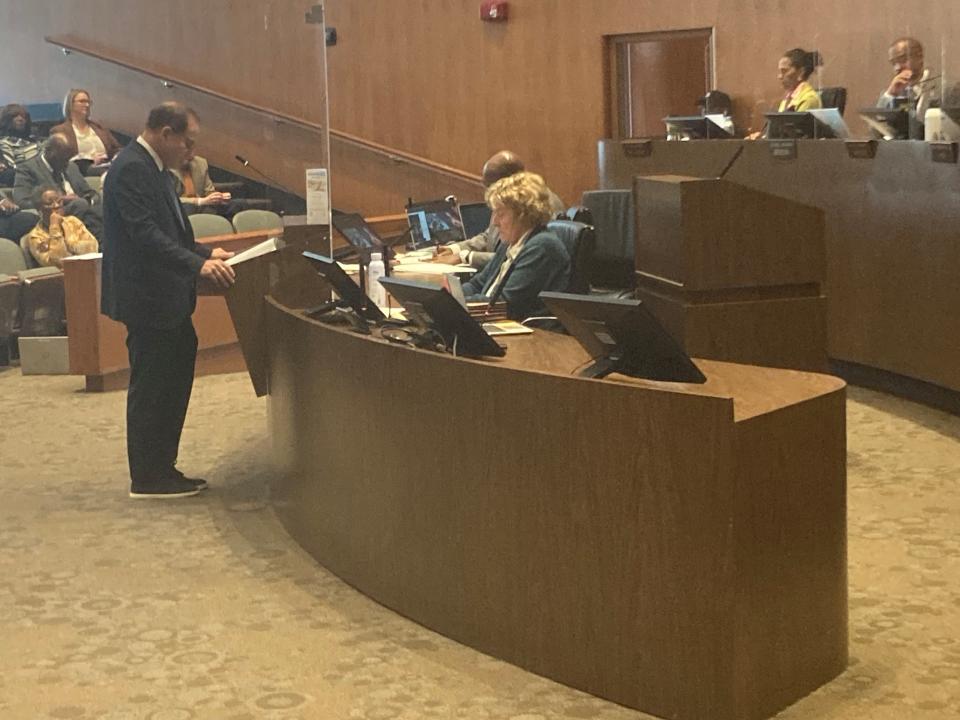Detroit City Council approves incentives, community benefits for $3B New Center development
Detroit City Council on Tuesday approved development incentives and a more generous Community Benefits package for a $3 billion development in the New Center area that is a collaboration among Henry Ford Health, the Detroit Pistons and Michigan State University.
Council members voted 6-3 on a series of approvals needed for the development, known as the Future of Health, which encompasses six projects, including a major expansion to Henry Ford Hospital, 662 units of mixed-income housing to be built by the Pistons organization and a new medical research center.
Last week, council postponed a planned vote after several members questioned the value of commitments by the trio of developers in the Community Benefits package.
The tax breaks and future tax captures for the development are valued at $296 million over 35 years, according to City Council documents. The developers also received approval Tuesday for zoning changes and a revised version of a Community Benefits package that was first put forth in December.
The five projects in the development that will get incentives have a $773 million price tag. (The sixth project, the $2.2 billion hospital expansion for the nonprofit health system, did not seek or receive any incentives.)

Council members in favor of the proposal were Mary Sheffield; James Tate; Scott Benson; Latisha Johnson; Fred Durhal III and Coleman Young II.
Those opposed were Angela Whitfield-Calloway, Gabriela Santiago-Romero and Mary Waters.
Council's vote followed more than two hours of public comments at Tuesday's meeting and an appeal to council members by Detroit Pistons Vice Chairman Arn Tellem.
The majority of the development incentives are to go toward construction by the Pistons organization of two new apartment buildings and conversion of Henry Ford Health's current corporate headquarters — One Ford Place — into housing.
Tellem told council members that the vision and the "seeds" for their development plan date to the organization's decision last decade to leave The Palace of Auburn Hills and move the team back to Detroit for the 2017-18 NBA season.

"Our move wasn’t just about playing games at Little Caesars Arena," Tellem said. "We made much more than a game day commitment. It was about planting our flag here in Detroit and in our New Center neighborhood.
"It was about moving all of our 300-plus employees here and making this our home, becoming embedded in this community. We committed to being all-in in Detroit and to contribute to the city’s ongoing revitalization."
More: Detroit City Council to vote on incentives for $3B New Center development
More: Detroit City Council members question developers, delay vote on $3B project
The benefits package approved Tuesday included several new commitments: a $2 million donation to the city's Affordable Housing Development and Preservation Fund; $1 million for a new community land trust; $750,000 for pre-college readiness training for high school students and a plan to help coordinate transportation services for seniors.
Previous developer commitments in the benefits package include accepting Section 8 housing vouchers for the 20% of the 662 apartments to be set aside as "affordable," starting a $2 million home repair fund for existing neighborhood residents; $500,000 for rental assistance and 50 free tuition MSU scholarships for area high school seniors.
The largest incentive for the $3 billion development is a so-called Transformational Brownfield, which would capture up to $241 million in local- and state-level taxes for the developers over 35 years.
With Tuesday's approval, the brownfield proposal could go before the Michigan Strategic Fund in Lansing for final approval in April.
Groundbreakings for the Henry Ford Hospital expansion and the new academic research center involving Henry Ford Health and MSU are expected later this year.
The value of the local tax abatements in the development is $55 million, according to a report by City Council's legislative policy division.
Council President Sheffield cited the additions to the Community Benefits package and her support for the hospital expansion and new medical research center as reasons why she voted in favor of the development.
"There is no perfect deal. I do believe that the (Community Benefits) process should be strengthened," she said. "But I do believe that we were able to make some progress.”
Councilman Tate also voted for the development, but suggested that he still doesn't agree with the developers' claim that the monetary value of their community benefits package totals $604 million.
Last week, Tate told the developers that he didn't believe in counting anticipated increases in uncompensated care at Henry Ford Hospital, which could result from having a larger and brand-new emergency room, as $310 million worth of community benefits.
“I do believe that what we have before us today is, without a doubt, the best that was able to be garnered," Tate said Tuesday. "I had some concerns and I had some very pointed questions about the way that the community benefits was calculated.
"And transparently, we still disagree on the actual way it was captured. But what we don’t disagree on are the services that are being provided and the tools that are being used.”
Councilman Benson, when explaining his reasons for approval, noted how Detroit experienced numerous hospital closures in the past. So he is glad to see a hospital system make big plans to expand in the city.
But for Santiago-Romero, who was among the three who opposed the development and incentives request, the Community Benefits package was still not big enough. She would have liked to see more money put in for affordable housing and home repairs in the neighborhood, she said.
"I’m really grateful for the additional funding that we have been able to receive," she said. "But for me, it’s not enough, unfortunately.”
And Councilwoman Whitfield-Calloway said she might have supported the development if the tax breaks had initially been for just two or five years, and if council had more authority to monitor and enforce compliance of commitments made by developers.
She pointed to the $1.5 billion District Detroit development, which council last year approved for similar tax breaks and incentives and which was originally supposed to break ground last summer. But so far, no construction has begun.
“This shovels in the ground promise has not been kept," Whitfield-Calloway said. “Simply stated, not all developers, but some developers, repeatedly promise terms and conditions that are either delivered late or completely ignored — and the City Council does not have the proper enforcement mechanisms or power to compel compliance."
Contact JC Reindl: 313-222-6631 or jcreindl@freepress.com. Follow him on X @jcreindl.
This article originally appeared on Detroit Free Press: Detroit City Council approves incentives, benefits for $3B project

